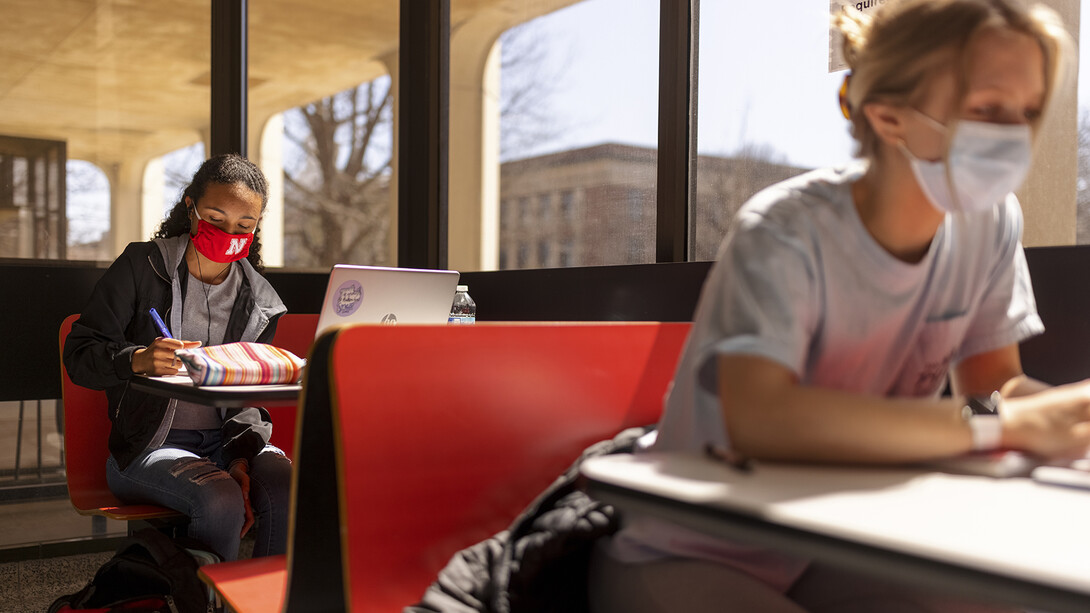
Due to the growing spread of the COVID-19 Omicron variant, the University of Nebraska–Lincoln is moving forward with new safety protocols for the spring 2022 semester.
Announced by Chancellor Ronnie Green in a Jan. 5 email to campus, the university’s updated protocols include:
The temporary use of facial coverings when indoors on campus;
required re-entry testing for all students, faculty and staff;
a random mitigation testing program;
changes to isolation policies for those who test positive;
plans for an on-campus vaccination/booster clinic; and
a request for students, faculty and staff to add booster information to the university’s voluntary vaccine registry.
“None of us wanted to start 2022 preparing for another surge of COVID-19. But, the Omicron variant has rapidly taken hold, and we need to take these actions to help ensure the safety of our campus community,” Green said. “As always, thank you for your continued commitment to safety, your patience and your goodwill toward one another as we move forward into what I know will be another successful semester.”
Required re-entry testing
At the start of the spring semester, the university is requiring one round of re-entry testing for all students, faculty and staff who plan to be on campus. The testing — which must be completed through the university’s on-campus, saliva-based testing program — will be staggered, starting the week of Jan. 9-13 for faculty, staff and student workers. All other students are asked to complete the testing during the first week of the semester, Jan. 14-21.
Appointments for the on-campus testing can be made through the Safer Community app or online testing portal. To accommodate the testing, expanded hours will be available Jan. 14-21.
Additional information regarding on-campus testing is available on the university’s COVID-19 website.
Individuals who have tested positive for COVID-19 with a PCR test in the last 90 days can claim a testing exemption.
Also, students traveling back to Lincoln are being asked to test prior to returning to campus. Huskers who test positive are asked to delay their return as required by the Centers for Disease Control.
“If you are vaccinated and have not yet gotten a booster, please do so before returning to campus,” Green said. “And, if you are not yet vaccinated, you are at a high risk for contracting the Omicron variant and we would strongly recommend vaccination.”
Working with the Lincoln-Lancaster County Health Department, the university will offer an on-campus vaccination/booster clinics on Jan. 26. The vaccine will be available from 9 a.m. to 1 p.m. in the Nebraska Union Ballroom, and 3 to 5 p.m. in the East Nebraska Union’s Prairie Suite. Registration is available. Drop in appointments are welcome.
Random mitigation testing
Starting the week of Jan. 24, the university will launch random mitigation testing among all students, faculty and staff (regardless of vaccination status). Those selected for the required testing will be notified via email the week prior. Details will also be available in the Safer Community app.
In the spring semester, the university will use the Safer Community app for scheduling of COVID-19 testing and for Huskers to receive testing results. It will not be used for access to campus buildings or events.
Isolation policy updates
Following updated CDC guidance, individuals who test positive for COVID-19 will be required to isolate for a minimum of five days. After the five-day period, individuals who are fever-free with all other symptoms improving may resume activities but must wear a face covering around others.
Students living in residence halls or Greek houses can resume normal activities after the five-day period, but must continue to sleep and eat in isolation for an additional five days.
The university continues to offer free isolation housing to all students.
Voluntary vaccine registry
Students, faculty and staff who have received the COVID-19 vaccine/booster are asked to upload their status to the university’s Voluntary Vaccine Registry. The information is used to evaluate the risk the virus may pose in the campus community and helps shape COVID-19 safety policies and protocols.
For more information on the university’s ongoing response to the global pandemic, click here.







